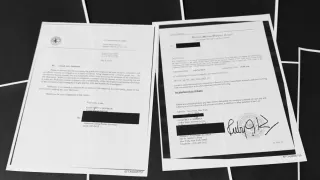March 1, 2022
Activism Grows Nationwide in Response to School Book Bans
Heather Hollingsworth and Hillel Italie READ TIME: 5 MIN.
Until a year ago, Stephana Ferrell's political activism was limited to the occasional letter to elected officials.
Then came her local school board meeting in Orange County, Florida and an objection raised to Maia Kobabe's graphic novel "Gender Queer: A Memoir." And the county's decision last fall to remove it from high school shelves.
"By winter break, we realized this was happening all over the state and needed to start a project to rally parents to protect access to information and ideas in school," says Ferrell, a mother of two. Along with fellow Orange County parent Jen Cousins, she founded the Florida Freedom to Read Project, which works with existing parent groups statewide on a range of educational issues, including efforts to "keep or get back books that have gone under challenge or have been banned."
Over the past year, book challenges and bans have reached levels not seen in decades, according to officials at the American Library Association, the National Coalition Against Censorship (NCAC) and other advocates for free expression. Censorship efforts have ranged from local communities such as Orange County and a Tennessee school board's pulling Art Spiegelman's graphic novel "Maus," to statewide initiatives.
"There are some books with pornography and pedophilia that should absolutely be removed from K through 12 school libraries," says Yael Levin, a spokeswoman for No Left Turn in Education, a national group opposed to what it calls a "Leftist agenda" for public schools that has called on Attorney General Merrick Garland to investigate the availability of "Gender Queer" among other books. "Now we're not talking about a public library or bookstores. We're talking about K through 12 school libraries, books that are just pornographic and with pedophilic content."
According to PEN America, which has been tracking legislation around the country, dozens of bills have been proposed that restrict classroom reading and discussion. Virtually all of the laws focus on sexuality, gender identity or race. In Missouri, a bill would ban teachers from using the "1619 Project," the New York Times magazine issue which centers around slavery in American history and was released last fall as a book.
The responses have come from organizations large and small, and sometimes from individuals such as Ferrell.
The American Civil Liberties Union, PEN America and the NCAC have been working with local activists, educators and families around the country, helping them "to prepare for meetings, to draft letters and to mobilize opposition," according to PEN America's executive director, Suzanne Nossel. The CEO of Penguin Random House, Markus Dohle, has said he will personally donate $500,000 for a book defense fund to be run in partnership with PEN. Hachette Book Group has announced "emergency donations" to PEN, the NCAC and the Authors Guild.
Legal action has been one strategy. In Missouri, the ACLU filed suit in federal court in mid-February to prevent the Wentzville school district from removing such books as "Gender Queer," Nobel laureate Toni Morrison's "The Bluest Eye" and Keise Laymon's memoir "Heavy." The civil liberties union has also filed open records requests in Tennessee and Montana over book bans, and a warning letter in Mississippi against what it described as the "unconstitutionality of public library book bans."
Vera Eidelman, staff attorney with the ACLU Speech, Privacy and Technology Project, cited the U.S. Supreme Court's 1982 ruling declaring that "local school boards may not remove books from school library shelves simply because they dislike the ideas contained in those books." The tricky area, Eidelman acknowledged, is that schools officials are allowed to ban books for reasons other than not approving of the viewpoints the books express. Officials might determine, for instance, that the book is too profane or vulgar.
"The problem is just that often our definitions, for example, of vulgarity or age appropriateness, are for lack of a better word, mushy, and they can also hide or be used as pretext for viewpoint-based decisions by the government," she said.
Two anti-banning initiatives were launched in Pennsylvania. In Kutztown, eighth grader Joslyn Diffenbaugh formed a banned book club last fall that began with a reading of George Orwell's "Animal Farm." The Pennridge Improvement Project has started a drive to purchase books that have been removed from schools, including Leslea Newman's "Heather has Two Mommies" and Kim Johnson's "This is My America," and place them in small free libraries around the district.
The wave of bans has led to new organizations and to a change of focus for existing groups. Katie Paris, an Ohio resident and the founder of Red, Wine & Blue, a national network of politically engaged "PTA mamas and digital divas" founded in 2019, said that last year she began receiving calls from members begging for help as debates over "critical race theory" erupted.
Red, Wine & Blue started online sessions it calls Trouble Maker Training, which includes such guidance as "Present a calm face to counter the yelling and shouting" and "Own individual freedom: You can decide what is right for your child, but you don't get to dictate what's right for other families." Red, Wine & Blue also launched a website that tracks book bans, raised about $65,000 to organize against bans and is organizing an event in March featuring authors of banned books and parents from communities where books are being challenged.
"We think education works best when it's parents and teachers working together," says Paris, the mother of 7- and 3-year old boys. "And if you don't want your child to have access to a book, then opt them out. That's fine. You just don't want to just take that opportunity away from my kids."
Trying to get a book restored is often like other kinds of community activism – letter writing, speeches, attending meetings.
Meenal McNary is a member of the Round Rock Black Parents Association, based about 20 miles from Austin, Texas. The association was founded in 2015 after a Black teenager was slammed to the ground by a police officer, but more recently became active in diversifying the curriculum and fighting efforts to remove books. Last year, a parent's objection led to Round Rock school district officials considering whether "Stamped: Racism, Antiracism, and You," by Ibram X. Kendi and Jason Reynolds, should be taken off middle school reading lists.
"We worked with a middle school teacher who started a petition, and that gained a lot of traction, with more than a 1,000 signatures," McNary says. The distract followed a three-step review process – culminating with a school board vote – during which McNary and others helped organize people into writing letters, turning up for board meetings and telling others about the petition.
"We had children speaking up in favor of this book, even though it was traumatic for some of them to read," McNary says. "We had everyone from middle school students to grandmothers and grandfathers stating their reasons why this should remain on the shelves. The board ended up voting in our favor and the book is still there."
___
Hollingsworth reported from Mission, Kansas.






